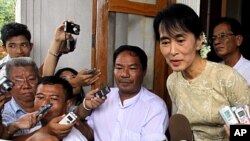Burma's democracy leader Aung San Suu Kyi says the country’s transition to an elected government is not enough and that all political prisoners must be released.
The Nobel Laureate made the comments to VOA’s Burmese service Correspondent Khin Soe Win who was granted a rare journalist visa, the first for the service in 16 years. Aung San Suu Kyi also spoke about talks with the government, the return of political exiles, and Western sanctions and aid.
Aung San Suu Kyi says that despite elections in 2010, Burma is still not a democracy, and that she wants to help the country establish strong democratic institutions.
|
Burma's pro-democracy leader Aung San Suu Kyi speaks with VOA's Burmese Service reporter Khin Soe Win, who is in Rangoon:
|
Burma’s overt and strict military government was replaced by a nominally civilian-led administration as part of what military leaders called a roadmap to democracy. But the election was widely condemned as a sham designed to cement military rule, and former officers still dominate the government.
In a TV interview Tuesday in Rangoon, Aung San Suu Kyi told VOA’s Burmese service the release of all political prisoners is needed for Burma to become a democracy.
"I don't think you can separate different elements of the process towards democracy," said Aung San Suu Kyi. "After all, the release of political prisoners is one of the aims of trying to democratize our country-that there may be no political prisoners. So, I don't think you should separate it and I don't think that you should make it a condition for talks. By talking to each other and by sorting out our differences, that could help us to hasten the release of political prisoners."
Rights groups say there are more than 2,000 political prisoners in Burma, and that little substantive change has occurred since the November elections, the first in 20 years.
Although Aung San Suu Kyi’s National League for Democracy won Burma’s last election in 1990, the military refused to give up power.
But there have been some small positive signs in the country, such as Aung San Suu Kyi being released from house arrest just days after the election. More recently, the government has slightly loosened its grip on the media and access to the country.
In August, President Thein Sein, himself a former general, met with Aung San Suu Kyi, and both said the talks were friendly. He also invited political exiles to return to Burma to help build the country, although at least one dissident journalist who accepted the offer was detained and questioned upon arrival.
Aung San Suu Kyi told VOA’s Burmese service it is a personal decision if exiles choose to return, but she noted that their political freedoms will not be the same.
“They must decide whether or not they want to come back under the circumstances," said Suu Kyi. "And, for those who are interested in taking part in the political process of the country, then they've got to decide whether they want to take part in the political process in the way in which it is possible to do here in Burma, or in the way in which they have been moving throughout these years abroad. Certainly, conditions will not be the same in Burma as abroad.”
Aung San Suu Kyi met a few days ago with U.S. special envoy to Burma Derek Mitchell. Mitchell also met with government officials and discussed conditions needed for the lifting of economic sanctions.
The U.S. and other Western countries limit trade with Burma because of its poor human rights record.
Aung San Suu Kyi told VOA’s Burmese service that sanctions should only be lifted once the situation has changed. She also urged Western aid donors to focus on health and education, which she says are still very poor in Burma.














